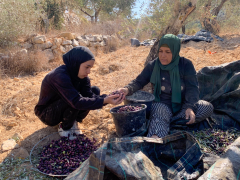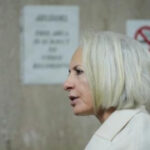Umm Safa, Occupied West Bank – Six-year-old Nasser Tanatra is scared of the rock-strewn hilltop where he used to play and pick flowers near his family home.
The boisterous child, the youngest of seven siblings, used to dash to the top of Jabal al-Ras with his 10-year-old sister Urood to gather wild sage and zaatar.
But in mid-September, about 20 Israeli settlers, protected by soldiers, erected tents and began living on the hilltop, about 50 metres (164ft) from the family’s two-storey home.
Ever since, they have attacked and harassed the Tanatras and their neighbours in the Palestinian village of Umm Safa. At night the settlers fire bullets into the air and release aggressive dogs to roam outside villagers’ homes. From above, they flash bright lights onto the houses, blare music and sing loudly.
But the worst incident for the Tanatras occurred soon after the new settlers arrived.
The family was watching the evening news when soldiers launched tear gas and settlers shot live bullets towards their home. Although nobody was injured, during the more than hour-long attack, a terrified Nasser slipped away from his family in panic and darted outside. He then ran under gunfire to his grandmother’s house 100 metres (328ft) away. He has been traumatised ever since.
“He says, ‘Mama, I am scared to leave the house. I am scared to sleep. I am not hungry. I am scared to go outside. I am scared to go to school,’” explained Nasser’s mother, Manal Tanatra, 40, with a frown, as she helped a neighbour gather olives in late October.
“This isn’t a life. It isn’t. Our house, our land, we are surrounded and strangled and attacked, and even to harvest our olives is a danger.”
The annual olive harvest season in October and November is a time when Umm Safa’s families come together to pick olives from the same trees their ancestors cultivated. But the arrival of the outpost and the increasing settler violence have made harvesting an activity fraught with danger, and the villagers can never be sure how a day in the groves will unfold.
In past seasons, Nasser accompanied Manal to the groves to play. Since the attack, he has barely left home.
![A view from the Tanatra family's land [Al Jazeera]](http://www.aljazeera.com/wp-content/uploads/2024/11/Olive-Tree-Landscape-Umm-Saffa-2-1731403526.jpg?w=770&resize=770%2C578)
‘During the day, we are strong’
Umm Safa, a village of several hundred people about 12km (7.5 miles) north of Ramallah, sits on a hillside above terraces of olive trees.
Since Israel’s war on Gaza started in October 2023, the villagers, like other Palestinians across Area C – the 60 percent of the occupied West Bank under full Israeli military control – have endured escalating restrictions from the Israeli military and attacks from settlers.
In normal times, the Tanatra family home is alive with the conversations and laughter of Nasser and his six older sisters, aged between 10 and 20. The family would play games together or, on special occasions, grill chicken or kebab outside.
These days, the house is quieter. The two eldest daughters, students at nearby Birzeit University, often stay on campus, due in part to the dangers on the roads from settlers and newly erected checkpoints where villagers describe being detained and even hit by soldiers.
Manal’s husband Saher used to work as a construction labourer in Israel and made about 6,000 shekels ($1,650) a month. The 50-year-old would go to work and return home each day for the sunset prayer. After the war started, Saher, like other Palestinian labourers from the occupied West Bank, had his permit to enter and work inside Israel revoked. He now hustles to make ends meet, braving road closures, settler attacks and military checkpoints to provide for the family of nine as a taxi driver in Ramallah. He earns far less than he used to.
“The work is very light in the taxi,” said Saher. “Each day, I might get only 50 shekels ($14). But 50 shekels a day is better than nothing.”
These days, he is lucky to return home at all, and often stays in Birzeit with his oldest children due to the precarious conditions. When he does make it home, he parks his taxi a distance away from the house and the outpost above them to try to keep it safe.
After it gets dark, nobody in the family – or the village – dares to step outside, fearful that soldiers may carry out arrest raids or that the settlers may attack.
“During the day, we are strong, we are together,” said Manal as she took a break from olive picking. “But in the night, we are all hidden in our homes, messaging each other, sleepless, fearful and worried about the violence that is waiting for us outside.”
![Manal sifting olives 2.jpg [Al Jazeera]](http://www.aljazeera.com/wp-content/uploads/2024/11/Manal-sifting-olives-2-1731403414.jpg?w=770&resize=770%2C643)
Systematic violence
Located between the illegal Israeli settlements of Halamish and Ateret, the people of Umm Safa have endured stone-throwing and land grabs by settlers for years.
Then, after the 32-year-old Israeli settler Zvi Bar Yosef established his first outpost, Zvi’s Farm, in the area in 2019, attacks against Palestinians escalated, often instigated by settlers grazing their herds on land belonging to the villages of Jibiya, Kobar, and Umm Safa. Villagers in the area report being assaulted by Bar Yosef and other settlers, at various times having teeth knocked out or being tied up, according to Israeli human rights group B’Tselem. In 2020, Naji Tanatra, a distant cousin of Saher’s, survived a skull fracture from being attacked by several settlers after he tried to drive Bar Yosef’s livestock from private Palestinian groves in Umm Safa.
Bar Yosef’s encroachment on Umm Safa escalated in the summer of 2023 when he set up a new outpost as a grazing area near olive groves just below the village’s main street. After meeting resistance from villagers, dozens of settlers from the nearby settlements and outposts stormed through the village, setting homes and cars on fire.
In July 2023, Israeli forces in separate incidents killed two villagers, Muhammad Bayed, 16, and ‘Abd al-Jawad Dar Saleh, 24, amid demonstrations against the settler takeover of village land.
The pressure intensified in the past year after the Israeli military erected further checkpoints nearby and blocked the two main village entrances with iron gates and mounds of dirt, leaving only a single, circuitous route through adjacent villages for cars to enter and leave.
Then, beginning in September, Bar Yosef – internationally sanctioned this year for inflicting violence on Palestinians and preventing them from accessing their land – established the outpost on Jabal al-Ras. It includes two tents and a barn for his sheep and goats. Bulldozers operated by settlers spent weeks creating a road for the outpost before the settlers moved in.
The outpost also affects the children who attend the local school, near the Tanatra home. Marwan Sabah, head of the Umm Safa village council, described how settlers shout and stare at children as they make their way to and from school. In October, according to Sabah, settlers shot at schoolchildren who were taking a break from class one morning, after which the school sent the children home.
Bar Yosef did not respond to Al Jazeera’s request for comment.
Settler outposts take different forms. Some have mobile homes, others tents. Shepherding outposts, like the ones run by Bar Yosef, are a recent tactic that enables settlers to take as much land as possible with only a small number of people. Although illegal under Israeli and international law, outposts are in practice provided with round-the-clock military security. They are widely understood to be part of a larger effort by settlers and – through demolitions, land policies and financial and security support of settlers – the state to drive Palestinians out of lands in Area C and create contiguity between the settlements, rendering any future Palestinian state in the occupied West Bank impossible.
![Saher and Manal Tanatra.jpg [Al Jazeera]](http://www.aljazeera.com/wp-content/uploads/2024/11/Saher-and-Manal-Tanatra-1731403592.jpg?w=770&resize=770%2C578)
‘Baba and I are here to protect you’
On a sunny day in late October, a week after Manal helped her neighbour pick olives, she and her daughter, 18-year-old Nagham, a physical therapy student, harvested olives on their family land. Manal’s sister-in-law, Abla, 37, and her mother-in-law, Kifah, 61, worked on a terrace above them.
At noon, Abla and Kifah climbed down to share a lunch of fresh vegetables, labneh, olives, bread and homemade olive oil with Manal and Nagham under the shade of a tree.
The four women were harvesting the 15 dunams (1.5 hectares) and 150 olive trees that have been in the family since Saher’s great-grandfather came to Umm Safa. He was violently expelled from his village of Tantura during the Nakba, or catastrophe, in 1948 when Zionist troops forced at least 750,000 Palestinians from their homes and lands.
“Though Umm Safa is a small area, it’s filled with horror,” said Abla. “Filled with horror. You have the settlements of Ateret, Halamish; Jabal Al-Ras is now a horrifying military zone.
“Everything is enclosed around us, and no one can come to the rescue no matter what happens.”
Since the outpost was established, Manal and her children nervously check the windows at night, watching for signs of the next attack. Often, they are the ones being watched.
“When I come to the house, [the settlers] watch me,” said Manal. “When I leave the house, they watch me. When we get in the car, we just look forward and drive straight – straight! And pray to God to





